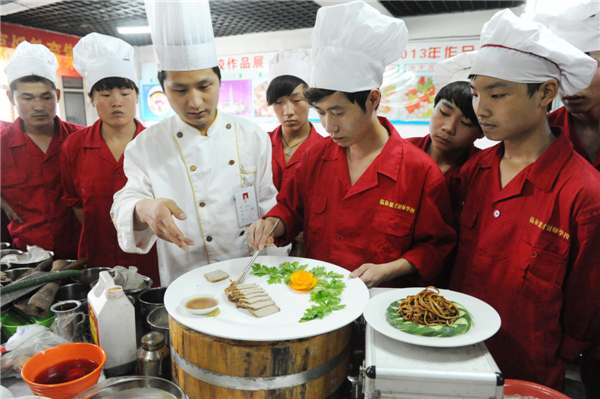 |
| Students learn how to make chinese cold dishes at a privately owned vocational school for chefs in Fuyang, Anhui province. Wang Biao/For China Daily |
"I chose to study at Chien-Shiung especially because I am a huge fan of machines and large equipment. I am not too much of an academic person. What I have learned at school can be really useful in my father's factory," he said.
Wang Yonglin, a standing committee member of the Taicang City Committee of the Communist Party of China, says vocational education in the city should become the template for the nation.
While many people still think vocational school graduates are those unable to get enrolled at universities, this perception has changed in Taicang. More than 50 percent of the junior high school graduates choose to go to vocational schooling, while less than 50 percent go to high schools.
Young people in Taicang are willing to go to vocational schools largely because there is no barrier between these schools and colleges. About 10 percent of the technical secondary school graduates will continue to pursue their studies at colleges. The local education authorities have also cooperated with Tongji University in Shanghai so that students can complete their education at a higher level.
Wang said: "Vocational education does not indicate an end period - as can be seen in Germany. We should bring the same system here to China so that students will be more willing to go to vocational schools. The ultimate goal of pursuing whatever kind of study is to ensure employment, which vocational education in Taicang can do."
A total of 250 million yuan was invested to expand technical secondary schools in Taicang in 2011 and the figure rose to 280 million yuan last year.
In 2000, traditional industries in Jiangsu province began to transform into emerging industries.
"The trend has become even more noticeable since 2008, as economic growth slowed and exports shrank. The local authorities have realized that labor-intensive industries have lost their competitive edge and are attaching more importance to tech-savvy industries, which have higher demands on talent," Wang said.
The courses at local vocational schools are changing accordingly. Biochemical, logistics, port management, business outsourcing and even cultural and creative industry courses can now be found on the timetables of vocational schools in Taicang.
Zhou Hongbin, director of Taicang Education Bureau, said: "Vocational education in Taicang is very much tailored to its industrial restructuring. For higher vocational education, more importance is now attached to cultural and creative industries, while the central government is making great efforts to nurture industries such as animation.
"Attempts in other cities that turned out to be failures can largely be attributed to less attention from the government. This kind of cooperation between companies and schools must be initiated and led by the local government," he added.

 Storms leave 97 dead, 58 missing in Mexico
Storms leave 97 dead, 58 missing in Mexico New model of indigenous surface-to-air missiles testfired
New model of indigenous surface-to-air missiles testfired  118.28-carat diamond to be auctioned in HK
118.28-carat diamond to be auctioned in HK Maternal love under streetlight
Maternal love under streetlight Naked foreign student sits in the middle of a road in Haikou
Naked foreign student sits in the middle of a road in Haikou  Colorful Yunnan: Enjoy the natural beauty
Colorful Yunnan: Enjoy the natural beauty Harbin named Chinese city with most beautiful women
Harbin named Chinese city with most beautiful women New college students' military training in Guangzhou
New college students' military training in Guangzhou Rugby girls
Rugby girls PLA's 38th Group Army conduct training
PLA's 38th Group Army conduct training Residences of the royal house of Savoy
Residences of the royal house of Savoy The last days of Wan Aihua
The last days of Wan Aihua Highlights at 12th National Games of China
Highlights at 12th National Games of China Beijing Film Academy welcomes freshmen
Beijing Film Academy welcomes freshmen Large mahjong party sets new world record
Large mahjong party sets new world recordDay|Week|Month